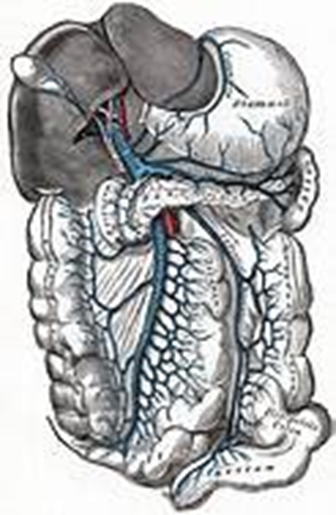The nurse is caring for a client with cirrhosis and portal hypertension. Which statement by the client is cause for the greatest concern?
"I have a tight sensation in my lower leg when I forget to put my feet up."
"I can't button my pants anymore because my belly is so swollen."
"I'm very constipated and have been straining during bowel movements."
"When I sleep, I have to sit in a recliner so that I can breathe more easily."
The Correct Answer is B
Choice A: “I have a tight sensation in my lower leg when I forget to put my feet up.” This statement may indicate the presence of edema, which is common in cirrhosis due to hypoalbuminemia and sodium retention. However, it is not as immediately concerning as other symptoms because it can often be managed with diuretics and compression. It is important to monitor for worsening edema, as it can lead to increased discomfort and risk of skin breakdown.
Choice B: “I can’t button my pants anymore because my belly is so swollen.” This statement is concerning because it suggests the development of ascites, which is the accumulation of fluid in the peritoneal cavity, causing abdominal swelling. Ascites can lead to abdominal discomfort, difficulty breathing, and is a sign of advanced liver disease with significant portal hypertension. It requires medical evaluation and management, which may include paracentesis (removal of fluid), diuretics, and sodium restriction. Cirrhosis is a late stage of scarring (fibrosis) of the liver caused by many forms of liver diseases and conditions, such as hepatitis and chronic alcoholism. Portal hypertension is an increase in the blood pressure within a system of veins called the portal venous system. Veins from the stomach, intestine, spleen, and pancreas merge into the portal vein, which then branches into smaller vessels and travels through the liver.
Choice C: “I’m very constipated and have been straining during bowel movements.” While constipation is uncomfortable and can indicate dietary issues or side effects from medication, it is not typically a direct complication of cirrhosis or portal hypertension. However, straining during bowel movements can increase the risk of bleeding from esophageal varices if they are present, so it is important to manage constipation to prevent potential complications.
Choice D: “When I sleep, I have to sit in a recliner so that I can breathe more easily.” This statement indicates orthopnea, which can be associated with ascites or pleural effusions (fluid in the lungs), both of which can occur in the setting of cirrhosis and portal hypertension. While this symptom is concerning and affects the client’s quality of life, it is generally less concerning than the development of ascites, as it can be managed with adjustments in sleeping position and medical management of the underlying fluid accumulation.

Nursing Test Bank
Naxlex Comprehensive Predictor Exams
Related Questions
Correct Answer is B
Explanation
Choice A reason:While sharing needles can transmit hepatitis, it is more commonly associated with hepatitis B and C, not hepatitis A.
Choice B reason:Eating shellfish from contaminated water is a well-known route of transmission for hepatitis A, aligning with the client's symptoms.
Choice C reason:Blood transfusions were a risk for hepatitis transmission in the past, but since the 1990s, blood products are screened for hepatitis, making this an unlikely source.
Choice D reason:Unprotected sex can be a route of transmission for hepatitis, but hepatitis A is more commonly spread through ingestion of contaminated food or water, not sexual contact.
Correct Answer is C
Explanation
Choice A reason: A fractured femur, while a serious injury, does not inherently contraindicate the use of lipid emulsions. These patients may require additional nutrition if they are unable to eat adequately by mouth, and lipid emulsions can be part of their parenteral nutrition regimen if needed.
Choice B reason: Severe anorexia nervosa is a condition that can lead to malnutrition and may necessitate the use of parenteral nutrition, including lipid emulsions, to provide essential nutrients. However, care must be taken to avoid refeeding syndrome, a potentially fatal condition that can occur when malnourished patients begin to refeed too quickly.
Choice C reason: Gastrointestinal obstruction is a condition that could be exacerbated by the administration of lipid emulsions. In cases of obstruction, enteral or parenteral nutrition may need to be carefully managed or avoided until the obstruction is resolved to prevent further complications. While lipid emulsions are a valuable component of parenteral nutrition, their use must be carefully considered in the context of the patient’s overall clinical condition. In the case of gastrointestinal obstruction, the nurse would be most concerned about the prescription of a lipid emulsion due to the potential for exacerbating the obstruction and complicating the patient’s condition.
Choice D reason: Chronic diarrhea and vomiting can lead to dehydration and electrolyte imbalances, but they do not directly contraindicate the use of lipid emulsions. However, the underlying cause of these symptoms should be addressed, and fluid and electrolyte balance should be carefully monitored.
Whether you are a student looking to ace your exams or a practicing nurse seeking to enhance your expertise , our nursing education contents will empower you with the confidence and competence to make a difference in the lives of patients and become a respected leader in the healthcare field.
Visit Naxlex, invest in your future and unlock endless possibilities with our unparalleled nursing education contents today
Report Wrong Answer on the Current Question
Do you disagree with the answer? If yes, what is your expected answer? Explain.
Kindly be descriptive with the issue you are facing.
